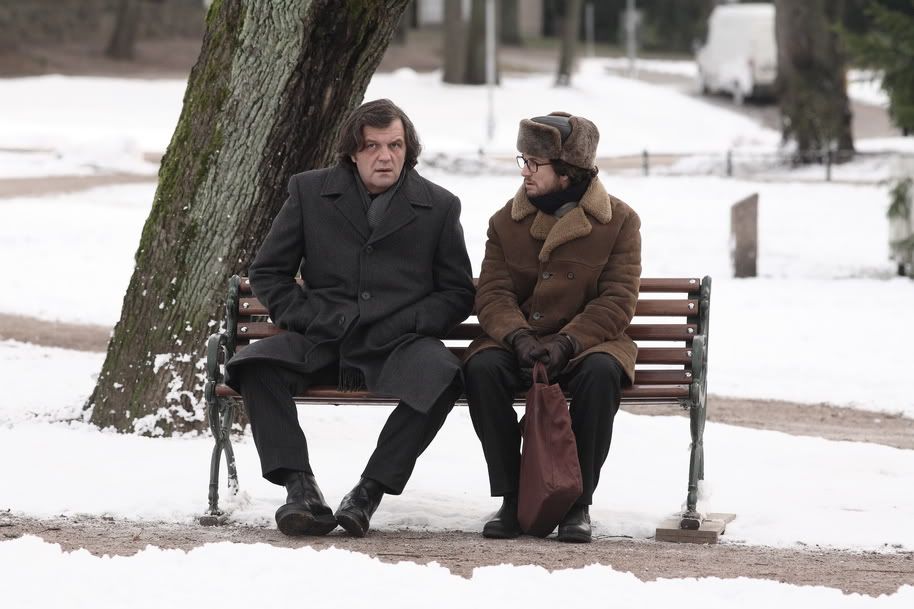Friday, July 23, 2010
Farewell
Most films involving espionage are a branch of the action genre, even when they're not parodies like the James Bond series. At most you get a dash of "love interest," as in Ridley Scott's Body of Lies, for a breathing space between the detonations.
Farewell (titled in French L'Affaire Farewell) is a welcome exception, interested at least as much in personality and politics as in the mechanics of spying. Based on historical events, it is both suspenseful and psychologically powerful.
In the early 198os, a Soviet dissident called Colonel Gregoriev in the film (his real name was Vladimir Vetrov; code name "Farewell") chose to defect in place. He had access to secret documents that he was willing to convey to the West. Being a KGB insider, though, he knew too well that the agency had penetrated its opponents' intelligence ops in Moscow. He needed a foreigner who was squeaky clean with no connection to any spy ring to act as a go-between.
He found just such a person in Pierre, working for the French company Thomson in Moscow. At first unwillingly, and never comfortable with secret meetings and carrying stolen material to his boss in Paris, Pierre proved to be the catalyst for events that reached the highest levels of government. Ultimately, the information obtained by "Farewell" and smuggled by Pierre not only enabled the French to roll up Moscow's network in Paris, but provided Ronald Reagan with evidence of the Soviet government's weakness. According to the film, this knowledge gave Reagan an edge in the Cold War: with a military build-up and the threat of the "Star Wars" anti-missile defense, the United States forced the Soviet Union into a new chapter of the arms race that bankrupted it and led to its downfall.
Gregoriev/"Farewell" and Pierre, interestingly, are both played by film directors. Emir Kusturica (Gregoriev) has made lots of movies, albeit few have had a U.S. release; some 20 years ago, I reviewed his Time of the Gypsies for the Santa Fe weekly paper. All I can recall is that I thought it was imaginative. Guillaume Canet (Pierre), in addition to an acting career, directed the excellent 2006 mystery thriller Tell No One.
Kusturica, a first-rate actor, turns out to be revelatory as Gregoriev. He has terrific screen presence and creates a complex, heroic but humanly fallible character — a man who has taken a step he knows he can never go back from, giving him a slow-burning intensity. Canet was a problem for me at first. He plays Pierre as emotionally closed, precise and formal. He probably designed the performance for maximum contrast with Gregoriev. Pierre's repression is convincing, but dramatically his first scenes are numbingly inert.
Yet, while staying in character, Canet gradually lets us in on a little of Pierre's emotional life. He is lovingly committed to his wife and children, and some of his granite demeanor is because of fear, knowing that he is endangering them. And — although we don't find out why — we see that Pierre is drawn to the secret world, continuing as a conduit between Gregoriev and Pierre's masters in Paris (who now include the French president, Mitterand) when, despite pressure to carry on with the business, he could have shut the door.
Ironies abound. Gregoriev isn't anti-Communist, he's an ultra-believer in the worker's paradise, which he thinks the post-Leninist leadership has corrupted and sabotaged. His wife Natasha is having an affair with another KGB agent — who later turns out to be his interrogator. His son doesn't give a toot for politics, and sullenly lurks in his room listening to the rock band Queen. Gregoriev too has a side dish, an attractive KGB functionary named Alina. There are further ironies, but to reveal them would be a spoiler.
Director Christian Carion's previous film was Merry Christmas, about the temporary fraternization of German and French soldiers on the front lines during the holiday in 1914. I found it to be an impeccably made snoozer, with an obvious story line. No such problems here. The plotting is as suspenseful as it should be, with a few "Hitchcock moments" for extra electricity, and the performances Carion obtained from his actors are spot-on: not only Kusturica and Canet (and it cannot have been very comfortable directing other directors), but also Ingeborga Dapkunaite as Natasha, Alexandra Maria Lara as Pierre's wife, and Dina Korzun as Alina.
Fred Ward's portrayal of Reagan is notable — he makes the Gipper's vocal inflections, phrasing, and even the tone of the voice uncannily accurate, without exaggeration or caricature. Even Willem Dafoe, whom I don't care for as an actor, offers just the right blend of bureaucratic patriotism and smarmy cant as a CIA officer.
Production values are terrific. The settings are convincing, including Ukraine and Finland for Russia; the musical score is spare but effective; and the sound recording and mixing are as good as I've ever heard in a film, providing ambience rather than artificial excitement. But the technical virtues would not have gone for much without its insight into the characters' inner drama. Farewell should take its place among the finest espionage films ever made.
Disclosure: I received a DVD "screener" from the public relations company for Farewell's U.S. release.
Subscribe to:
Post Comments (Atom)





3 comments:
When is it coming out, Rick?
David,
It's opened in New York and the PR company representative said it would be here this weekend, although I don't see it listed. Soon, probably.
I actually believe that we'd be better off if the Cold War was still underway. Our Dear Leaders would have to protect our borders and they'd have to unify us around a common culture instead of forcing us to accept ever-increasing levels of "diversity."
We didn't win anything, when we "won" the Cold War. Maybe the Russians and the Eastern Europeans got something out of it, but not us. And even the Eastern Euros are being suckered into multi-culti and population replacement; they'd be better off under the Soviet Union ultimately, than under the EU.
Post a Comment